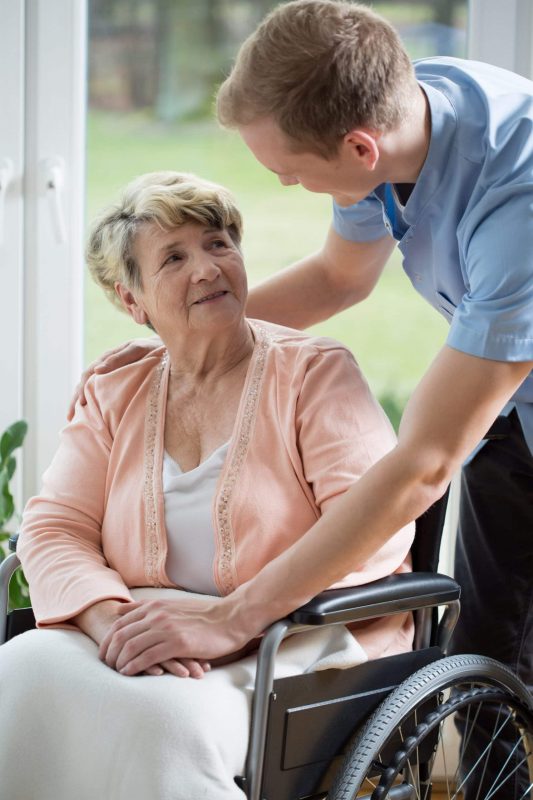What is healthcare at home?
Healthcare at home is where a carer visits a person in their home to provide medical support detailed within an individual care at home plan.
In Nayland Care’s view, your care plan should promote independence. This is why personal care visits are often scheduled for when medication must be taken.
It may well be that you just need help reminding you to take your medication or it could be that you need a carer to administer it for you. Either way, details are contained within your care plan on how you are to be supported with medication.
Can a home care assistant administer medication?
Yes, but only if they have been trained to do so. That’s why all our home carers are fully trained – in accordance with the UKHCA medication policy - to provide medication support.
A carer’s exact level of involvement and support in administering medication is detailed within your individual care plan, alongside specific dosages, timings, and doctors’ details.
What are the benefits of medication support?
It can be quite a responsibility remembering to take different medications throughout the day, some with food, others without. Having a carer support you with your medication will help limit how much your medication dictates your everyday living. Carefully planned medication support is often a welcome relief for people and can become effortlessly routine, with the right care.
It may well be that you’re happy to take your own pills or inject your insulin, but just need the reassurance of a second person that you have taken the correct dosage at the right time.
Or maybe you need to apply cream to an area that is difficult to reach on your own. Having medical assistance can be a real benefit.
Equally, you may need us to administer your medication if you are assessed as being unable to do so. Either way, with medication support, you are in safe hands.
What are the three levels of support with medication?
There are three levels of medication support. Level 1 is where the person receiving support self-medicates with guidance, Level 2 is where the carer administers medication and Level 3 is where carers administer medication using a specialist technique.
The important thing to remember is that you’ll never be given a ‘level’ as a person since it might well be that you’re able to take your pills, but you need help administering medicated cream.
That’s why it is important that your care plan is carefully considered and, where required, includes input from your doctor.
What is a medication support plan?
NICE describes the term ‘medicines support’ as any support that enables a person to manage their medicines. What is included within an individual’s medication support plan varies depending on a person’s needs.
The assessment of a person’s medication support needs must form part of an overall assessment of needs and preferences for care and treatment.
An important point to remember is that a carer cannot take responsibility for managing a person’s medicines unless the overall assessment indicates the need to do so, and the patient agrees. The reason for this is to encourage independence, wherever possible.
How can medication be kept safe at home?
How and where you store your medication safely at home depends on several things. Essentially, in accordance with the Care Quality Commission guidelines, medicines should be stored in a way that means they are safe and effective when administered.
Each medication will come with its own storage requirements specified by the manufacturer. Some, for instance, must be stored at certain temperatures and others may be for emergency usage only and therefore stored separately to other medications to save confusion.
Each person needing healthcare at home support will have their own set of medical concerns as well as prescribed and non-prescribed medications. If the visiting personal carer is responsible for overseeing or administering medication, they will make sure that the medication is safely returned to its safe storage before they leave.
If you have any questions about how to store your medication safely at home, you should always contact your GP or pharmacist in the first instance. If your healthcare at home carer has the relevant permissions to liaise with your GP on your behalf, they may be able to do this for you.
Why is medication safety important?
Medication safety is incredibly important to healthcare at home since taking the wrong amount can have a detrimental effect on a person’s health, and in some cases be life-threatening. Likewise, forgetting to take medication can be just as serious.
Whether a person is taking long-term medication they are familiar with or a short course of antibiotics or anti-inflammatories, it’s important to follow the recommended medication safety guidance and be familiar with possible side effects.
It is the responsibility of the prescriber (usually a GP or hospital doctor) to make sure a person is on the correct medication. Likewise, it is the responsibility of the individual to make sure it is administered correctly. That’s why some people choose to have healthcare at home help so that they have someone else who can assist them in taking their medication correctly. After all, it can get confusing when you must take several different types of medication each day, some with food and others without.
At Nayland Care, we always carry out a healthcare at home assessment to determine how much support a person needs with their medication. We will provide enough support to ensure safe administration but not too much – this is so that you retain as much control and autonomy as possible.
Our carers are trained to support the full administration of medication, and in some cases, we can supply extra training for specialist medication tasks such as peg feeding.
How do you qualify for home health care?
How a person qualifies for healthcare at home in England and Wales depends on a person’s individual circumstances and care needs. How much you must pay for healthcare at home depends on several factors, including your income and savings.
If you’re having trouble with everyday tasks, including administering your own medication, you can ask your local council to conduct a care needs assessment. With your permission, a carer, GP, or other healthcare professional can make a referral for an assessment.
The local authority will assess your financial status as to how much you will be expected to contribute to the cost of your care. If you are eligible for support, the local authority has a duty of care to meet those needs, but it can charge for services depending on your income and savings.
Once you have been assessed, our experienced home care team will carry out a full care needs assessment to create a healthcare at home plan for you.
Alternatively, you may be eligible for NHS funding (if your care needs meet specific criteria), or you may choose to fund your care privately.











